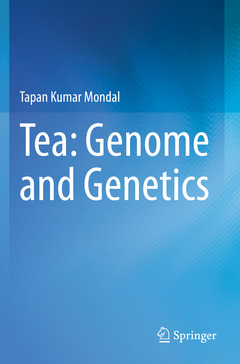Tea: Genome and Genetics, 1st ed. 2020
Auteur : Mondal Tapan Kumar

Tea is an important non-alcoholic beverage plant of the world. Cultivation of tea is also commercially very important as it earns huge revenue for the tea growing nations especially the developing countries such as India. Although conventional breeding is well-established and contributes significantly for varietal improvement of this plant and other Camellia species with ornamental value, yet, applications of biotechnology vis a vis genomics are essential to improve the productivity and quality of the tea. This book brings out various aspects of breeding, biotechnology and genomics of tea plants. It covers i) Origin and descriptions of health benefits as well as morphological classification as first chapter, ii) Breeding and cytogenetics that comprise with various conventional approaches of varietal improvement of tea along with their genetic resources, iii) Micro-propagation which deals with in-depth study of clonal propagation, iv) Somatic embryogenesis along with alternative techniques such as suspension culture, cry-preservation etc, v) Molecular breeding that deals with application of various DNA based markers such as discovery of QTL, linkage map etc, vi) Genetic transformation and associated factors, vii) Stress physiology complied various works done in tea along with its wild relatives on abiotic as well as biotic stress and viii) Functional genomics that describes the various works of molecular cloning and characterizations, differential gene expression, high-throughput sequencing, bioinformatics transcriptomics study that described the application of next generation sequencing to discover various genes that are related to various trait of tea, Non-coding RNA which describes the discovery of various non-coding RNA in tea and related genera. The book also discusses recent developments in biotechnology such as metabolomics, proteomics, genome sequence and popular clone varieties of tea crops that are developed across the world.
In conclusion, the book collates the work on tea plantations so far, identified the problems, analyzes the gaps on breeding and biotechnological works of tea as well as its wild species and discusses the future scopes as conclusion. The book aims to cover all latest information till june, 2020 . It will be useful resource for post-graduate, doctoral as well post-doctoral students working on tea as well as other woody plants. This will also be useful for the scientists working in the areas of life sciences, genomics, biotechnology and molecular biology.
Dr. Tapan Kumar Mondal joined at Institute of Himalayan Bioresource Technology (CSIR), Himachal Pradesh, India, for his Ph.D degree which he completed in 1998. After that, he served as Deputy Manager, Research and Development Department, Tata Tatley Ltd, Munnar, Kerala till March, 2002. Since then up to 2010, he further served as Assistant Professor at North Bengal Agricultural University, Cooch Behar, West Bengal. Later in February 2010, he joined as Senior Scientist (Plant Biotechnology) at National Bureau of Plant Genetic Resource (ICAR), New Delhi. From 2016, he is working as Principal Scientist at ICAR-National Institute for Plant Biotechnology, New Delhi. He carried out his Post Doctoral training with Prof. J. K. Zhu of University of California, Riverside, USA, on ‘Regulation of small RNA under cold stress of Arabidopsis’ and later worked at University of Illinois, Urbana-Champaign, USA, on ‘Identification of nitrogen use efficient genes of maize by RNAseq’.
Dr. Mondal has significantly contributed in various areas of biotechnology and genetic resource management of tea. His work leads several maiden findings in tea such as in vivo somatic embryogenesis, discovery of miRNA, lncRNA, cirRNA of tea for the first time, development the first transgenic tea plants. His team decoded the mitochondrial genome and for the first time in tea. Recently his team did the genome sequence of Indian Tea cultivar TV-1. He has also submitted several genome and gene sequences of tea at NCBI and also published more than 60 publications in this area. He was PI of various projects of tea biotechnology funded by DBT, DST, ICAR and Tea Board, India. He is the recipient of University merit scholarship, scholarship from Indian Tea association, ICAR JRF, DBT fellowship, CSIR fellowship and life member of several professional societies. He has written one book tea biotechnology and edited one book on Wild Oryza Genome. His team has developed several database on tea and deve
All-inclusive collection of information on tea breeding and biotechnology
Presents latest research in genomic and physiological studies on tea plantation
Describes genetic resources such as different clone of tea crop from all the tea growing nations
Date de parution : 12-2021
Ouvrage de 312 p.
15.5x23.5 cm
Disponible chez l'éditeur (délai d'approvisionnement : 15 jours).
Prix indicatif 105,49 €
Ajouter au panierDate de parution : 12-2020
Ouvrage de 312 p.
15.5x23.5 cm
Disponible chez l'éditeur (délai d'approvisionnement : 15 jours).
Prix indicatif 105,49 €
Ajouter au panierThèmes de Tea: Genome and Genetics :
Mots-clés :
Tea Research; Tea Biotechnology; Breeding; Tea Genome; Transgenics


